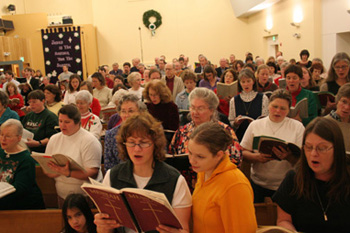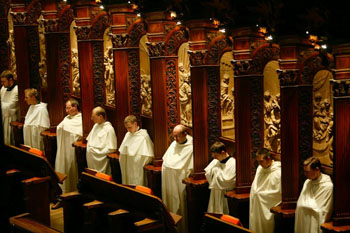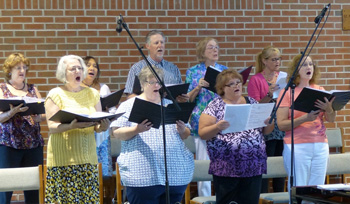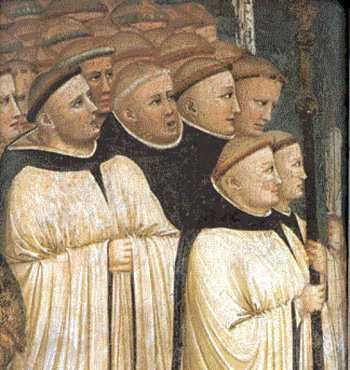Dialogue Mass - LXVIII
Preparing for the Novus Ordo Missae
Dr. Carol Byrne, Great Britain
Anyone who sets out to consider the reforms of Pius XII in their historical detail cannot fail to notice the sequence of events linking them to the Novus Ordo Missae.
In the Instruction De musica sacra (1958), the “community Mass” was, to the delight of the progressivist reformers, given explicit approval by the Pope, down to the finest detail of lay “active participation.” The Instruction laid the foundation for the final creation of the Novus Ordo Missae insofar as it gave the laity an integral role in the enactment of the Mass:
 Congregational singing, introduced by Pius XII in his instruction De musica sacra (1958)
Congregational singing, introduced by Pius XII in his instruction De musica sacra (1958)[color][size][font]
§ 21: “Everything which the liturgical books prescribe to be sung, either by the priest and his ministers, or by the choir
or congregation, forms an
integralpart of the sacred liturgy.” [emphasis added]
For something to be an integral part of the liturgy, it must be an intrinsic element of those activities of which the liturgy is composed, necessary for its completeness, and one which the principal actor (the priest) cannot properly function without.
Of course, § 21 meant that the prescribed texts must be sung in their entirety. Nevertheless, the impression is conveyed, through elliptical wording, that when the laity sings the liturgical texts, their “active participation” is as integral to the liturgy as the singing of the priest, his ministers and the choir. But that is a Protestant, not a Catholic, viewpoint: It was Luther who made the congregation and the choir equal in importance and held that the singing of the congregation was no less integral to the service.
If we wish to know the authentic Catholic position that guided the Church throughout History, it was expressed by Pope Pius X:
“The Church is essentially an
unequal society, that is, a society comprising two categories of persons, the Pastors and the flock, those who occupy a rank in the different degrees of the hierarchy and the multitude of the faithful.” (1)
[/font][/size][/color]
 Traditionally clerics or monks composed the church choir - Photo from the New Liturgical Movement
Traditionally clerics or monks composed the church choir - Photo from the New Liturgical Movement[color][size][font]
In the context of this two-tier system, it is of the greatest significance that the choir was traditionally considered a class apart from the congregation because its function of singing the liturgical texts belongs to the Bishops and the clergy. In other words, the choir is essentially a clerical entity.
It follows, therefore, that choir members – even though they may be laymen – exercise “a real liturgical office,” for which purpose it was laid down that they should “wear the ecclesiastical habit and surplice.” (2)
As for the other category of persons included in the “multitude of the faithful,” no specific directives were given to them by Pius X, from which we can infer that they were under no obligation to sing the liturgical texts. This is indisputably clear in his explanation that, apart from the singing of the “celebrant at the altar and the ministers,” “
all the rest of the liturgical chant belongs to the choir.” (3) [emphasis added]
The ordinary faithful were, therefore, by definition not included among the singers performing liturgical functions. So, there are no grounds for believing that Pius X had a congregational rendition in mind when he issued his
motu proprio on Sacred Music in 1903.
Even before he became Pope, when he was Bishop of Mantua and Patriarch of Venice, the future Pius X issued docuмents on Sacred Music. (4) It is interesting that while they are all practically identical in wording and content to the 1903
Latin motu proprio, none of them mentioned “active” participation of the laity – or even broached the subject of congregational singing.
Contrast with Pius XII Very different was the approach of Pius XII under the influence of the Liturgical Movement. He not only exhorted communal singing of the Mass, but issued a positive mandate for its accomplishment:
[/font][/size][/color]
 What we have today: Badly dressed vocalists lead the congregational singing
What we have today: Badly dressed vocalists lead the congregational singing[color][size][font]
“Every effort must be made that all the faithful throughout the world learn to sing these parts [of the Mass]” (
De musica sacra§ 25 a and b)
There is nothing comparable in any of the docuмents signed personally by Pius X, either before or during his papacy. He had always promoted the formation of male-voice choirs, [5] particularly among seminarians, and the instructions he issued in his
motu proprio for training in Gregorian Chant were directed exclusively to clergy, seminarians and choirs. The only “active participation” he promoted for the laity was in the temporal sphere which they must infuse with Christian principles.
As
we have seen, mandatory rubrics for lay activism in the liturgy were an invention of Pius XII, and first appeared in the 1956 Ordo for Holy Week. This innovation was later developed in Vatican II’s Constitution on the Liturgy, which stipulated that when the liturgical books were revised, they “must carefully attend to the provision of rubrics also for the people’s parts.” (
Sacrosanctum Concilium § 31)
The pre-eminent assembly displaces the celebrating priest When the General Instruction of the
Novus Ordo was produced in 1969, Cardinal Ottaviani noted its “obsessive references to the communal character of the Mass,” adding that “the role attributed to the faithful is autonomous, absolute – and hence completely false.”
[/font][/size][/color]
 Monks chanting in a procession
Monks chanting in a procession[color][size][font]
The blame for this deviation from Tradition can be laid at the door of the “new theology” espoused by the Liturgical Movement – and later adopted by Vatican II – which rejected the clearly defined two-tiered clergy-laity paradigm and redefined the Constitution of the Church as a homogeneous “communion” of all the faithful.
The liturgical innovators reduced the priest to the same level as the laity on the basis of their “common priesthood,” the only discernible difference being the functions allocated to them in the liturgy. Thus, the sacramental priesthood was dissolved into Luther’s “universal priesthood of all believers.”
From this fundamental error, which disguises the difference in essence between the baptized faithful and the ordained priesthood, came the novel concept that the congregation had both the
right and duty to sing or recite liturgical texts formerly reserved to the clergy.
How did such a startling distortion of the clergy-laity distinction, reminiscent of Luther’s abolition of the priesthood, begin to take hold in the Church?
Pius XII incubated the early stages of the process by conceding many of the
desiderata of the reformers in the realm of “active participation” of the laity. If, as
De musica sacra § 21 states, everyone’s singing of the liturgical texts is integral to the liturgy, there is basically only one celebrant: the assembly. (6)
And all who exercise the role of singer – celebrant, clergy, choir, soloist, the congregation – do so as members of the assembly. The song of the assembly becomes
ipso facto more important than that of any individual, including the priest celebrant.
However, few today perceive the ideological nature of the engine pulling the Liturgical Movement’s train, or realize the deeper and more subversive issue for the Church – the diminution of the celebrant’s role in the Mass and the ease with which lay people could take over the ministry of priests. For, what was being impugned by the progressivist reformers from Beauduin to Vatican II was
the right of the clergyto sing or say Mass – which is their divinely appointed role – without the people muscling in on the liturgical action.
The inevitable consequence of the new liturgical theology was the declericalization of the liturgy to focus on the primacy of the assembly.
Continued [/font][/size][/color]